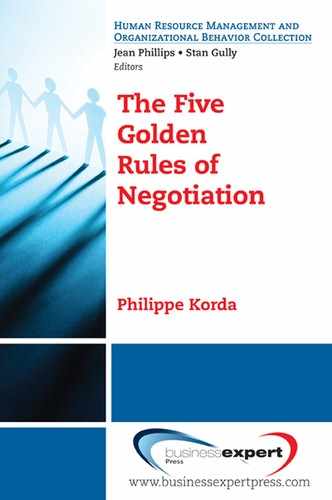In the Restaurant
Carl RITCHIE: Those final negotiations were always going to be really difficult. I had to make some major concessions to clinch the deal.
Margaret PEAKE: You got the deal, which is what you wanted.
Carl RITCHIE: I got the deal all right, but on very poor financial terms, although admittedly the balance of power was really working against me.
Margaret PEAKE: Do you really think so?
Carl RITCHIE: Well, that was the impression you gave me (stopping for a moment to collect his thoughts). What gave me that impression deep down?
Margaret PEAKE: You know, Carl, in negotiations the balance of power depends on a number of adjustable cursors.
Carl RITCHIE (intrigued): Cursors?
Margaret PEAKE: Yes, “cursors of power,” which can be on either the seller’s side or the buyer’s.
Carl RITCHIE: Giving you the balance of power?
Margaret PEAKE: Yes, and a major part of the negotiating game consists in “applying pressure,” that is to say, making your opponent understand, or believe, that all the cursors are set in your favor.
Carl RITCHIE: For example?
Margaret PEAKE: “I’m your company’s biggest customer in this region” is the cursor of size. Reference to “your competitors” is the cursor of choice.
Carl RITCHIE: Yes, I see. And the “report into production costs” was the cursor of information, was it?
Margaret PEAKE: Yes, just as the bit about the “buyers’ association” used the cursor of influence.
Carl RITCHIE: And the threat to leave the matter to your successor involved the cursor of time.
Margaret PEAKE: As for next year’s big project, it adjusted the cursor of sanction in my favor, while the appeal for fair treatment used the cursor of legitimacy.
Carl RITCHIE: It’s all becoming quite clear to me now. There are seven cursors that determine the balance of power, and you need to analyze them dispassionately in order to assess the balance of power and to shape your proposal accordingly.
Margaret PEAKE: You can be even more subtle.
Carl RITCHIE (disappointed): Yes?
Margaret PEAKE: The cursors express power, but the balance of power is also a question of desire, and above all a question of expertise.
Carl RITCHIE: You’ll need to explain that to me.
Examining the balance of power between buyer and seller involves three levels of analysis. Indeed, a negotiator’s power derives from three factors:
- Their “intrinsic” negotiating power, which is connected to the positioning of the “seven cursors,” which Mr. Ritchie has just heard all about
- The propensity of the negotiator to use (or not use) this power
- The personal capacity of the negotiator to take advantage of her power
In order to analyze these three factors, let us start by identifying the real powers of the customer. We shall then move on to see how to combat those powers and to tilt the balance of power back in your favor.
